70 citations,
February 2016 in “EMBO reports” Scientists found a specific group of itch-sensing nerve cells in mice important for feeling itch but not for sensing heat or touch.
 17 citations,
July 2018 in “International Journal of Cosmetic Science”
17 citations,
July 2018 in “International Journal of Cosmetic Science” Keratin-based particles safely improve hair strength, smoothness, and heat protection.
 3 citations,
May 2011 in “Medical Hypotheses”
3 citations,
May 2011 in “Medical Hypotheses” Transnasal cooling could reveal new insights into various physiological conditions and may be a natural way to transfer heat from the brain.
2 citations,
August 2014 in “Journal of the American Academy of Dermatology” A rare case of scleredema in a diabetic woman showed loss of sweat glands, causing heat strokes, with treatment only slightly improving symptoms.
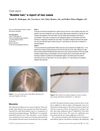 2 citations,
October 2006 in “International Journal of Dermatology”
2 citations,
October 2006 in “International Journal of Dermatology” Excessive blow-drying can cause "bubble hair," leading to hair loss and fragility, but improves when heat use is reduced.
 March 2010 in “Cosmetic Dermatology”
March 2010 in “Cosmetic Dermatology” Hair straightening methods have advanced to improve effectiveness and reduce damage, but still rely on heat and chemicals.
November 2020 in “Journal of animal science/Journal of animal science ... and ASAS reference compendium” Certain genetic variants in PRLR and PCCA genes may lead to shorter hair in cattle, which could help with heat tolerance.
 80 citations,
March 2008 in “Contact Dermatitis”
80 citations,
March 2008 in “Contact Dermatitis” Nearly half of the French individuals surveyed reported having a sensitive scalp, more common in women, often linked to hair loss and symptoms like itching, and triggered by factors including shampoos and pollution.
34 citations,
December 2009 in “Journal of the American Academy of Dermatology” Improper use of ceramic flat irons can cause severe hair damage.
 21 citations,
July 1988 in “Clinics in dermatology”
21 citations,
July 1988 in “Clinics in dermatology” Good haircare and communication with doctors are key for managing hair loss.
 19 citations,
February 2010 in “Journal of Chemical & Engineering Data”
19 citations,
February 2010 in “Journal of Chemical & Engineering Data” Flutamide, dutasteride, and finasteride dissolve differently in supercritical carbon dioxide, with dutasteride dissolving the least.
 19 citations,
September 1995 in “Food and nutrition bulletin”
19 citations,
September 1995 in “Food and nutrition bulletin” Leucaena leucocephala is nutritious but needs careful processing to remove toxins.
8 citations,
January 2016 in “Skin research and technology” The 12-point scale is better for evaluating small changes in hair condition after using hair care products.
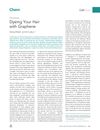 5 citations,
April 2018 in “Chem”
5 citations,
April 2018 in “Chem” Graphene-based hair dye is a safe, durable, and effective alternative to traditional black hair dyes.
 3 citations,
January 2009 in “Sen'i Gakkaishi”
3 citations,
January 2009 in “Sen'i Gakkaishi” Using both TGA and DTDG in hair straightening reduces hair damage compared to using TGA alone.
2 citations,
January 2016 in “Springer briefs in molecular science” Using natural sources as hair conditioners can help restore shine and softness to damaged hair.
 September 2023 in “Frontiers in medicine”
September 2023 in “Frontiers in medicine” The mTOR signaling pathway is crucial for hair health and targeting it may lead to new hair loss treatments.
 July 2023 in “Hair transplant forum international”
July 2023 in “Hair transplant forum international” Eating the right foods can improve hair health by reducing damage and providing proper nutrients.
 April 2023 in “The journal of investigative dermatology/Journal of investigative dermatology”
April 2023 in “The journal of investigative dermatology/Journal of investigative dermatology” The TRPV3 channel structure changes linked to severe itch and hyperkeratosis were identified using cryo-EM.

The document concludes that the new model realistically simulates male baldness and could be useful for medical purposes and entertainment.
 December 2016 in “Journal of evolution of medical and dental sciences”
December 2016 in “Journal of evolution of medical and dental sciences” Skin problems are common in thyroid disorders, with dry skin in hypothyroidism and warm, soft skin in hyperthyroidism.
 November 2016 in “PubMed”
November 2016 in “PubMed” Hair becomes thinner, grayer, and may fall out more as people get older, and styling habits can worsen these effects.
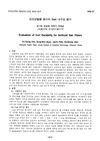 January 2007 in “Proceedings of the Korean Fiber Society Conference”
January 2007 in “Proceedings of the Korean Fiber Society Conference” New resin B makes artificial hair fibers hold curls longer than traditional resin A.
 January 2000 in “Optics Letters”
January 2000 in “Optics Letters” Laser treatment can inhibit hair growth and different hair colors reach different temperatures when lasered.
35 citations,
October 2003 in “Dermatologic clinics” Laser therapy on darker skin has higher risks and needs expert handling.
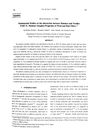 9 citations,
January 1989 in “Sen'i Gakkaishi”
9 citations,
January 1989 in “Sen'i Gakkaishi” Wool and hair fibers absorb moisture similarly due to their keratin structure, with the amount of non-crystalline areas affecting the moisture uptake.
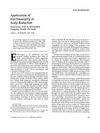 3 citations,
March 1994 in “The Journal of Dermatologic Surgery and Oncology”
3 citations,
March 1994 in “The Journal of Dermatologic Surgery and Oncology” Using a tungsten needle for scalp reduction surgery improves healing, reduces hair loss, and lessens scarring.
January 2021 in “Annals of Chinese medicine” Male pattern baldness may increase COVID-19 severity risk.
January 2012 in “Journal of Chengdu University of Traditional Chinese Medicine” Traditional Chinese Medicine effectively treats hair loss by addressing specific body imbalances.
January 2008 in “Shanghai Journal of Traditional Chinese Medicine” Androgenic alopecia can be treated by identifying specific syndromes and using combined internal and external treatments.



















